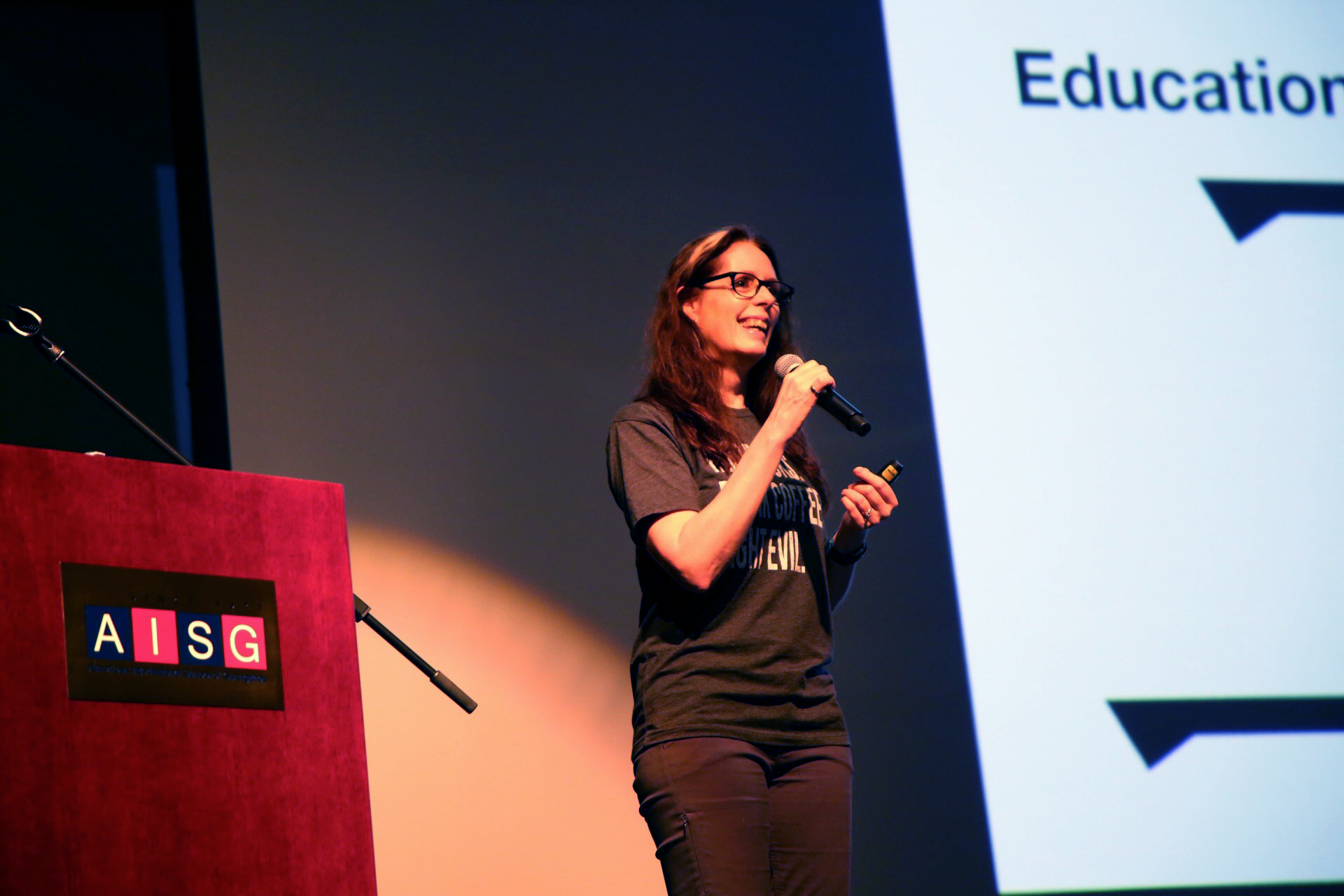
This year, AISG coordinated a visit with YA author and activist Laurie Halse Anderson. Halse Anderson is from Syracuse, New York and has written many YA novels such as Speak, Wintergirls, and Twisted, and has also written historical fiction novels such as Fever 1793. She came to our school on January 11 and was here until January 16. During her visit, she gave speeches to the English classes in the library, then hosted an assembly on the 16th. She talked about a number of topics, such as her life, her books, and writing advice. During her assembly, she spoke more about publishing and being an author.
I first attended her library session with my English class, and she told us the three reasons why she is an author: she is tall, she has a short attention span, and she has a vivid imagination. She then proceeded to talk about her high school years, stating the fact that due to her height, she had to sit in the back of the classroom, which was one of the reasons for her disinterest in school. Due to a combination of this and her short attention span, she was disinterested by her assigned reading and was instead drawn to books in the library. Once she graduated high school, she decided against going to college and instead stayed home and lived with her parents. She was forced to get a job milking cows to pay the rent in her house (an attempt by her father to get her to go to college), and soon tired of that, she decided to go to Onondaga Community College in New York, and later on, to Georgetown University in Washington DC to study linguistics. It was during college that she turned everything around and developed an interest in learning, and it was then she decided to start writing. At first, she tried writing a children’s book but didn’t fully understand what the writing process really was. After multiple rejection letters, she tried something different, and instead of correcting simple mistakes in her book, she revised and made it better. She later got the inspiration for her first YA book, Speak, from a nightmare about a girl crying. She made multiple drafts and was rejected many times, but ultimately learned new things about writing and got her book published.
In another one of her library lectures, I was able to ask her a number of questions concerning her life and her interests. One subject she was adamant about was her intense dislike of classic books. She did not like reading classics in high school but said that she has “gone back […] and reread them and [she] actually liked them.” Some of her favorite classics include Shakespeare plays and The Grapes of Wrath by John Steinbeck. She also acknowledged her need to have diversity in books and “wants [her] reading experience to be much broader than that narrow shelf of books we call ‘the classics’.” Some of her favorite writers include Neil Gaiman, Margaret Atwood, and David Mitchell. She said she’s “not a huge fan of fantasy with elves and trolls, although [she does love] Harry Potter.” The conversation then turned to her books, and she said that, out of all her characters, she most identifies with Hayley Kincaid (Knife of Impossible Memory), because “that book is a lot like [her and her] dad.” Her books carry many different messages aimed at teens, but she said that she actually does not think of the message while she is writing a book. Her belief is that “you can get lots of different messages depending on who you are. What the reader brings to the book is just as important as what the author brings.” The only message she wants is for “a kid to close [her] book and say ‘That was great!’.” She then began to talk about her life as an activist and different causes she is passionate about. Her most supported cause is social justice. She recognizes her position of privilege in the US, so she tries “to use that position to bring up new authors, especially authors of color, people who are not straight, and people from different economic backgrounds.” She is also a big promoter of reading for fun and encourages young children to read. Laurie Halse Anderson also gave some advice to aspiring writers. She said that her favorite piece of advice is to “keep revising” and she further explained how “revision is about clarification, not spelling and grammar.” She also said that, when she gets writer’s block, she likes to go for a run and listen to music.
Hopefully, students and teachers will be able to take something away from her visit and take her reading and writing advice to heart. Many were excited about her visit, and hopefully, everyone has learned something from listening to her untraditional yet interesting road to success.
One thought on “Laurie Halse Anderson: Author and Activist”
Sorry, comments are closed.